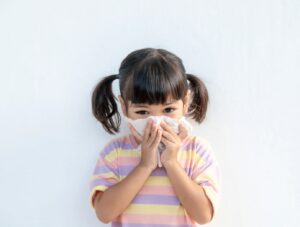Sore throat is a common issue among children, especially during flu season or when the weather changes. It can cause discomfort and interfere with daily activities like eating, drinking, and speaking. Early recognition and proper management are key to helping your child recover quickly. This article explores the causes of sore throat in children, symptom relief, and preventive measures.
Example Scenario: Tommy’s Experience
For example, 8-year-old Tommy complained of throat pain, particularly in the mornings and when swallowing. His parents grew concerned as he began refusing meals. Understanding the root cause of a sore throat is key to choosing the right treatment.
Symptoms of Sore Throat in Children
The symptoms of sore throat may vary depending on the cause. Common symptoms include:
- Painful Swallowing: Difficulty or pain while swallowing food, water, or saliva.
- Hoarseness: Loss of normal vocal tone due to throat inflammation.
- Coughing: Often accompanied by dry cough due to irritation or infection.
- Fever: A common sign of the body fighting off an infection.
- Redness or Swelling: Visible redness or white spots in the throat, indicating infection.
Common Causes of Sore Throat in Children
- Viral Infections: The most frequent cause, linked to conditions like the flu or common cold. Accompanied by symptoms such as a runny nose and fatigue.
- Bacterial Infections: Strep throat is a common bacterial cause, often presenting with high fever and swollen tonsils.
- Allergies: Pollen, dust, or pet dander can irritate the throat, leading to soreness and coughing.
- Dry Air: Particularly in winter, heating systems can dry out the air, causing throat irritation.
- Gastroesophageal Reflux Disease (GERD): Acid reflux can lead to throat pain, particularly after meals.
How to Relieve a Child’s Sore Throat
If your child has a sore throat, try these effective remedies:
- Stay Hydrated: Encourage warm liquids like herbal tea or water to keep the throat moist. Avoid spicy or acidic foods.
- Saltwater Gargle: A mixture of warm water and salt can help reduce inflammation.
- Use a Humidifier: Add moisture to the air to prevent further throat irritation.
- Avoid Irritants: Keep your child away from smoke, pollution, and allergens.
- Over-the-Counter Pain Relief: Use age-appropriate medications like acetaminophen or ibuprofen for pain and fever relief (consult a doctor first).
- Consult a Doctor: Seek medical attention if symptoms persist for more than a few days or are accompanied by severe pain, difficulty breathing, or high fever.
Preventing Sore Throat in Children
Prevention is always better than cure. Here’s how you can reduce the risk of sore throat:
- Boost Immunity: Provide a balanced diet rich in vitamin C, zinc, and protein to strengthen your child’s immune system.
- Practice Good Hygiene: Teach regular handwashing and discourage touching the face to prevent the spread of germs.
- Avoid Sick Contacts: Limit interaction with individuals who show signs of illness.
- Maintain Healthy Habits: Ensure adequate sleep, hydration, and regular physical activity to promote overall health.
Conclusion
A sore throat in children is a manageable condition with proper care and preventive measures. Understanding the causes and symptoms can help parents act promptly and effectively. However, persistent or severe symptoms require medical consultation. With the right approach, your child will soon return to their active, happy self.
Additional FAQs
Q1: When should I take my child to a doctor for a sore throat?
If the sore throat lasts more than three days, or if symptoms like high fever, difficulty breathing, or severe pain occur, visit a doctor promptly.
Q2: Can a sore throat be contagious?
Yes, viral and bacterial infections causing sore throats are highly contagious. Practice good hygiene to reduce spread.
Q3: Is it safe for children to use saltwater gargles?
Yes, children over the age of 6 can safely gargle salt water under supervision.
Q4: What foods should my child avoid with a sore throat?
Avoid spicy, acidic, or hard foods that may worsen irritation. Opt for soft and warm foods instead.
Q5: Are sore throats seasonal?
Sore throats are more common during flu season or colder months but can occur year-round due to allergens or infections.
References
- Mayo Clinic, "Sore Throat in Children"
- American Academy of Pediatrics, "Sore Throat"
- WebMD, "Sore Throat Causes and Treatments"













